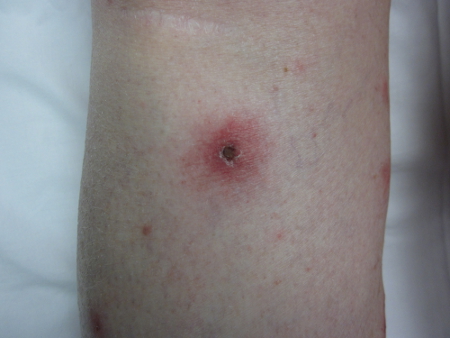Summary
Definition
History and exam
Key diagnostic factors
- history of tick bite/exposure
- history of immunosuppression
- fever
- headache
- malaise
- myalgia
- arthralgia
- nausea
- small erythematous lesion with or without necrotic center
- nonspecific rash
Other diagnostic factors
- vomiting
- diarrhea
- abdominal pain
- cough
- dyspnea
- stiff neck
- confusion
- photophobia
- stupor
- coma
- seizures
- lymphadenopathy
- jaundice
- hepatomegaly
- splenomegaly
- secondary infections
Risk factors
- tick bite/exposure
- immunosuppression
- age over 60 years
- male sex
Diagnostic tests
1st tests to order
- CBC
- LFTs
- peripheral blood smear
Tests to consider
- immunofluorescence antibody assay
- polymerase chain reaction
Emerging tests
- Western immunoblotting
- culture
- immunohistochemistry
Treatment algorithm
adults
children
Contributors
Authors
Juan P. Olano, MD
Professor
Department of Pathology
University of Texas Medical Branch
Galveston
TX
Disclosures
JPO is the author of a number of references cited in this topic.
Peer reviewers
Hariharan Regunath, MD, FACP, FIDSA
Adjunct Assistant Professor of Clinical Medicine
Department of Medicine - Divisions of Infectious Diseases and Pulmonary & Critical Care Medicine
University of Missouri
Columbia
MO
Disclosures
HR declares that he has no competing interests.
Richard Reithinger, MD, PhD
Professor
London School of Hygiene and Tropical Medicine
London
UK
Disclosures
RR declares that he has no competing interests.
Peer reviewer acknowledgements
BMJ Best Practice topics are updated on a rolling basis in line with developments in evidence and guidance. The peer reviewers listed here have reviewed the content at least once during the history of the topic.
Disclosures
Peer reviewer affiliations and disclosures pertain to the time of the review.
References
Key articles
Centers for Disease Control and Prevention. Tickborne diseases of the United States: a reference manual for health care providers. 6th ed. Atlanta (GA): U.S Department of Health and Human Services, Centers for Disease Control and Prevention; 2022.
Biggs HM, Behravesh CB, Bradley KK, et al. Diagnosis and management of tickborne rickettsial diseases: Rocky Mountain spotted fever and other spotted fever group rickettsioses, ehrlichioses, and anaplasmosis - United States. MMWR Recomm Rep. 2016 May 13;65(2):1-44.Full text Abstract
Reference articles
A full list of sources referenced in this topic is available to users with access to all of BMJ Best Practice.

Differentials
- Pneumonia, bacterial or viral
- Gastroenteritides, bacterial or viral
- Cholecystitis
More DifferentialsGuidelines
- CDC yellow book health information for international travel: rickettsial diseases
- Tickborne diseases of the United States: a reference manual for health care providers
More GuidelinesLog in or subscribe to access all of BMJ Best Practice
Use of this content is subject to our disclaimer